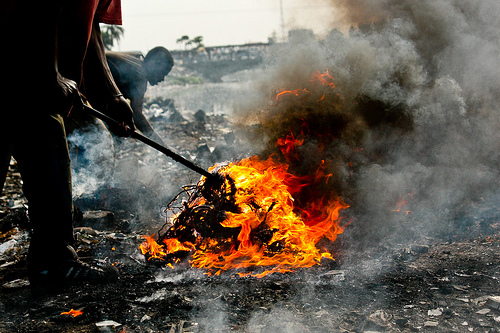Giant Kenyan e-Waste Scheme Hopes To Clean Up Toxic Tech

A new e-waste business, backed by Dell, could cut toxic hazards for Kenyans
A new tech recycling plant in Nairobi could be a lifesaver for Kenyan people involved in recycling e-waste. The site, backed by new regulations, aims to create a business out of safely processing discarded electronic equipment.
East Africa Compliant Recycling – the region’s first large-scale e-waste recycling facility – was opened this month by politicians, officials, and members of the IT industry, who hope that new regulations can clean up the toxic waste trade. Reprocessing IT waste has become big business in Africa, with disastrous consequences for workers – some of them children – who have been exposed to hazardous chemicals.

Getting tough on toxic crime
“We’re looking at ensuring that e-waste is recycled in such a manner that ensures our people are not exposed hazardous materials,” said the Honorable Amina A. Abdalla, MP, Chairperson, Committee of Environment and Natural Resources, Kenyan Parliament . “Basically, we’ve invested in getting out a regulation that is more proactive managing e-waste. With the regulation, its enforcement, and partnering with not only recyclers but producers, we’ll go a long way in addressing these challenges.”
The new regulations, it is hoped, will support a sustainable business processing e-waste and create green jobs and businesses. Dell is getting involved, providing micro finance for a separate project run by women from Nairobi’s Mukuru slums which safely collects and recycles e-waste.
The new regulations could generate business at the new e-waste hub by requiring electronics companies to meet certain thresholds for e-waste collection and treatment. This has become possible because of the dawning realisation that – particularly in developing countries – e-waste has monetary value. Setting more sensible import fees combines with this value to make recycling a viable business – and incidentally makes it easier for Kenyans to afford working IT equipment.
Sources involved with the new regulations have said that other African nations are watching the Kenyan experience, with a view to adopting similar regulations if things go well.
Shipping container collection
Waste is gathered at collection points housed in shipping containers throughout Kenya. Each one operates as an independent small business, buying e-waste from local collectors and selling it on to be reprocessed. Four collection points have been set up (two of them funded by Dell) and around forty more are planned.
Once a shipping container is filled to capacity, its contents are resold to the main hub where the e-waste will be reprocessed into raw materials which are sold back to the technology industry. Each stage of the model is designed to be profitable for participants, from individual collector to collection point to hub.
As well as protecting the environment, the model is designed to create thousands of green jobs, and clean up the unregulated informal e-waste “picker” industry. The IT industry is providing training programs to educate workers on the safe collection and recycling of e-waste.
The Dell-funded Mukuru project also uses mobile finance, allowing the 27 women to buy e-waste and resell it quickly and simply. In its first two weeks, the Dell-Mukuru collective filled 1.5 containers of e-waste, which was resold to the new recycling hub.
Like recycling? Our Green Quiz is only a year old!